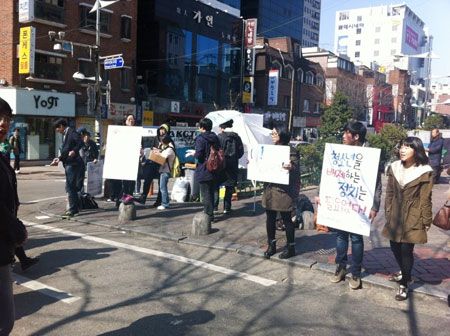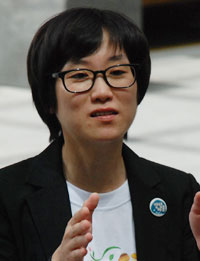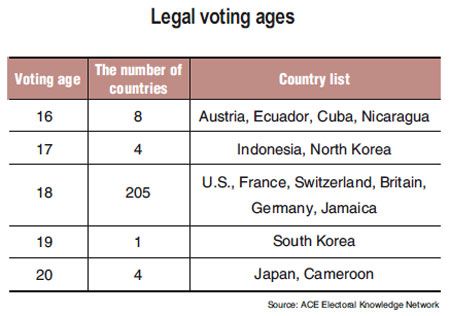
17 year-olds can serve in military but denied vote

Are you 18 years old? If so, you cannot vote in any elections in South Korea. You can neither join political parties nor express your views on a certain candidate because to do so is regarded as a form of political campaigning.
These are among the conditions of Korea’s voting and election laws which provoke plenty of questions about the political rights of minors. The issue has reignited ahead of the Dec. 19 presidential election.
According to the election law, those under 19 years old can neither vote nor participate in election campaigns. This means young people are prevented from posting any messages to support or oppose candidates on their Twitter or Facebook. “Because minors don’t have rights to vote, they cannot participate in election campaigns either both online and offline,” said Baek Seung-hun, an official from the National Election Commission.
“It is difficult to control all messages uploaded onto Social Network Services (SNS) because it is too huge and not many people state their age on SNS. But when a case is reported to us, we check the contents to see if it is repeated and intentional. It so, yes, it is illegal,” he said.
He explained punishments vary in accordance with how far each case influences the election.
“There will be administrative orders to delete the messages if the case is not that serious. But if it is judged to be a serious case, we can take punitive measures against the person responsible,” he said and admitted that no such orders have yet be pursued because of the difficulties involved in confirming the age of people on SNS sites.
The voting age in Korea was 20 years old till 2005 when it was lowered to 19.
When the Constitutional Court first dismissed a complaint about the voting age in 1997, it said minors are mentally immature, so are unable to make good choices.
Still, this kind of thinking probably continues against regular calls to further lower the voting age.
However, minors do not agree with this idea.
“Adults tend to think adolescents are immature. But I think values and reasoned thinking takes shape during adolescence,” said Yoo Ji-yun, an 18-year-old student preparing for a college entrance exam.
“When you are talking about politics, I don’t think age matters. Rather, I don’t think all adults have perfect knowledge about politics and people don’t necessarily have the faculties to make good judgments simply because they are older,” she said.
Shin Hye-won, 17, also a student, echoed Yoo by saying, “I think minors have enough ability to think about who they want to support or oppose. We are also interested in candidates and their pledges,” she said.
“Minors are part of the nation as well. I think the voting age should be lowered.”
Movements
Last month, Rep. Chang Ha-na of the Democratic United Party proposed legislation to lower the voting age to 18 from the current 19, to allow minors to join the election campaign so that they can express their political opinions.
“I proposed two bills to expand the political rights of minors. If you are not guaranteed your rights, you will be isolated in democratic society,” the lawmaker told The Korea Times.
“Minors don’t have the right to vote, which means they cannot choose their representatives who have great influence on their livelihood,” she said. “Also, I think minors should be able to raise their political voices in order to be able to take care of their future and their livelihoods.”
Chang claimed lowering the voting age could be the first step toward this.
“Many countries around the world already allow people to vote from the age of 18. The United Nation Committee on the Rights of the Child has also offered its advice, calling for the guarantee of young people’s political rights in Korea three times: in 1996, 2003 and 2011,” the lawmaker explained.
Actually, calls for lowering the voting age are not just about guaranteeing political rights, but are also related to growing concerns over declining voter turnout.
The turnout of the 13th presidential election in 1987 stood at 89.2 percent but since then, the figure has constantly decreased. The turnout of the 17th poll five years ago was only 63 percent.
Independent Rep. Jeong Jin-hoo, who proposed a bill to lower the voting age before Chang, said, “If the bill is passed, eligible voters will increase by nearly 700,000.”
Regarding prohibition of posting messages on SNS sites, Chang stressed that the local election law should be criticized because it is putting back the clock.
“Such actions will only enforce a negative image about participating in politics among adolescents. Then nobody can expect them to be fully aware of what it means to be a citizen even after they become grownups,” she said.
The virtue of democracy
Free elections are the proof of democracy in a society, a way for the public to participate in politics.
Aware of this, two lawmakers said in chorus that if minors are able to vote and express their political views, they can learn and experience the true value of democracy.
“In Korea, you can marry if you are over 18 years old. And you are required to serve in the military for two years if you are over 17 years old. This means the ability of minors to make responsible judgments is recognized in other laws,” Rep. Jeong said.
“For example, adolescents are people directly involved in education. If they can vote, they will be able to evaluate politicians’ educational policies,” he said. “It will boost political movements to actively solve educational problems.”
Indeed, an education chief election will be held along with the presidential election in December, but young people still cannot choose who will lead their education system.
Rep. Chang emphasized that various types of political participation can be seen as an education process to let the youth properly exercise their political rights in the future as a member of democratic society.
She claimed that “Expressing various views on politics, in particular on SNS sites, is not a subject to be restricted in accordance with a person’s age.”
“It will eventually be a way of protecting and guaranteeing the human rights of young people as well.” <The Korea Times/Jun Ji-hye>






